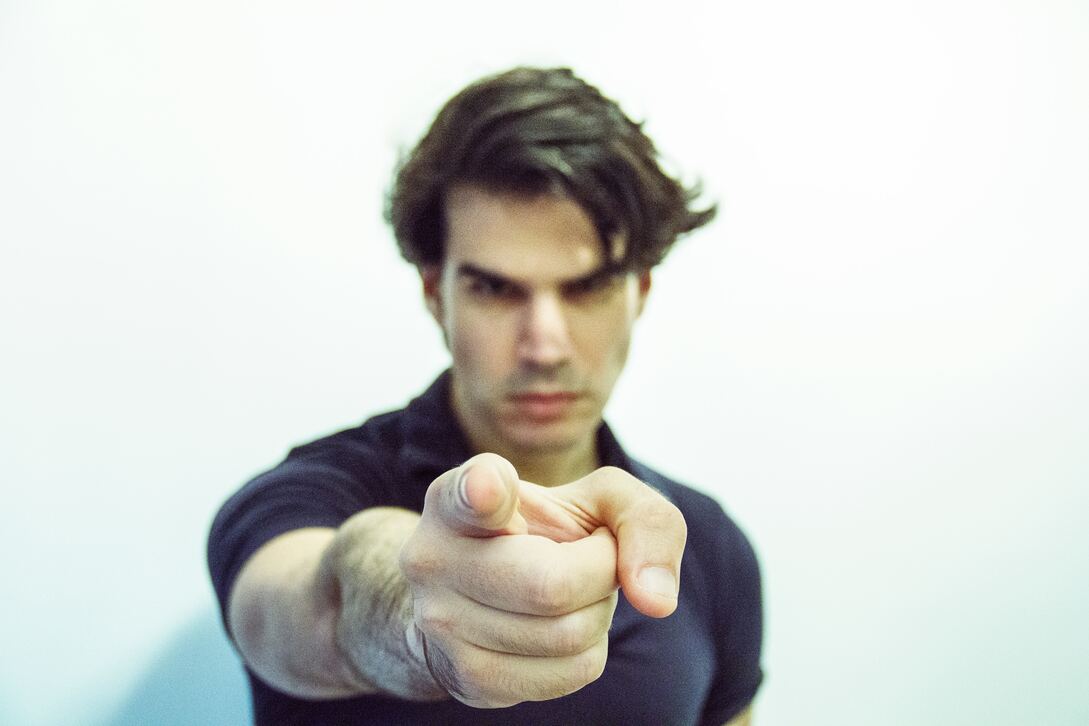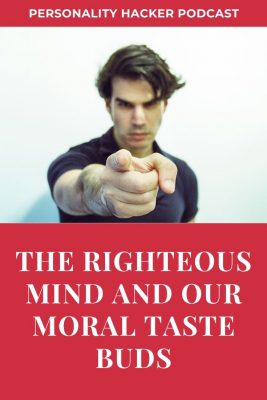Download Episode Here – right click link and select “Save Link As…”
In this episode, Joel and Antonia talk about Jonathan Haidt’s book The Righteous Mind – and how we can think about the “moral taste buds” we bring to the world.
In this podcast you’ll find:
- Food is very regional.
- Jonathan Haidt “Moral Taste Buds”
- People have different relationships with morality in the same way that people have different relationships with food.
- As the world becomes more globalized, our concepts of morality bump up against different flavors of morality.
- When people think of morals, they don’t think of it in terms of taste.
- They consider morals absolute.
- Our morals and values become embedded in our identity.
- One of the advantages we have, as we get more globalized, is we experience more culinary flair.
- As our tastes broaden, we realize how limited we have been.
- Our morality can also broaden and change as we expand our viewpoints.
- Morality isn’t as stagnant as we think it is.
- When we force ourselves to try something new, it builds character and gives us a broader perspective on other people.
- We are resistant to anything outside our framework. This is dangerous.
- We aren’t insinuating someone should change their morals/values.
- When we automatically adopt the morals and values around us, we are outsourcing these things to others.
- Bring your morals/values in-house. Make sure they are yours and not someone else’s.
- Jonathan Haidt “The Righteous Mind: Why Good People Are Divided by Politics and Religion”
- Robert Anton Wilson, in Prometheus Rising, said: “What the thinker thinks, the prover proves.”
- The assumption people have is that when it comes to making moral judgments, we are in control of our mind and intuition.
- The rider and the elephant.
- The elephant is our intuitive mind
- The rider is our rational mind
- The Prover is the Rider
- The Thinker is the Elephant
- The rider thinks he is control of the elephant, but he isn’t.
- Antonio Damasio “We are not thinking machines that feel. We are feeling machines that think.”
- We start with feelings and biases; then our thinking mind rationalizes all of it.
- We are more groupish than we are selfish.
- When our elephant heads a certain way and the rider is rationalizing the direction, it is usually on behalf of a group dynamic.
- It helps us build civilizations.
- It is a blind spot, though, because we can convince ourselves we are rational when we aren’t.
- When we create moral judgments and values, we can’t ignore a lot of bias, and groupthink is coming into it.
- Hollywood is in the business of make-believe, and they keep casting the narratives of how things should be.
- They understand the value of collective make-believe.
- We are prewired to care about certain things.
- Care vs. harm
- Fairness vs. cheating
- Loyalty vs. betrayal
- Authority vs. subversion
- Sanctity vs. Degradation
- Liberty vs. Oppression
- These are Modules that evolved to deal with common challenges.
- Care vs. harm is related to childrearing
- Anything that reminds us of the distress of a child gets folded into this care vs. harm trigger.
- Like animal cruelty
- Care vs. harm brings up the emotion of compassion
- The virtues are caring and kindness.
- When people value this module, they see themselves as kind, caring people.
- We all have these modules, but some come to the forefront more than others, depending on the individual.
- Fairness vs. cheating is where we reap the benefits of two-way partnerships.
- Marital fidelity.
- Emotions associated with this module are anger, guilt, gratitude
- The virtues associated with this module are fairness, trustworthiness, justice.
- We can see this module in little kids.
- At a certain age, this comes up with ferocity: “That’s not fair!”
- In the early days of our evolutionary adaptation, survival may have relied on this.
- Loyalty vs. betrayal was adapted to form cohesive coalitions.
- Groups of people that make sure we have each other’s back.
- Benedict Arnold
- Nationalism, patriotism, sports teams, etc.
- Emotions associated with this module are group pride and rage at traitors.
- Some religions treat their followers as traitors if they leave the fold.
- The virtues associated with this module are loyalty and self-sacrifice.
- Authority vs. subversion was adapted to forge beneficial relationships within hierarchies.
- Dominance and submission
- What’s the pecking order?
- Who is the boss?
- The characteristic emotions are respect and fear.
- The relevant virtues are obedience and deference.
- Most people might skew on the side of subversion.
- People struggle with authority, but this is the moral backbone for progress and order.
- A modern attitude is to feel a sense of distaste against authority because we have built civilization so well we can forget how much we benefit from hierarchies.
- This module is to foster safety.
- Sanctity vs. degradation was to avoid contaminants.
- We recognized early on the importance of staying away from dead bodies.
- How do we handle waste and disease?
- We now think of ideas in terms of sanctity and degradation, like Communism, racism, etc.
- The characteristic emotion is disgust. We are repelled by disease, human waste, and death.
- We also respond with disgust if someone presents an idea we find repellant.
- Virtues are chastity, piety, cleanliness, and temperance.
- We are more focused now on eating clean, organic food.
- How are we taking care of our bodies and our planet?
- The final module evolved later than the rest.
- Liberty vs. Oppression makes us think of the French and American Revolutions and the Age of Enlightenment
- An adaptive challenge is the overthrow of bullies and tyrants.
- Original triggers were reduced access to food and mates.
- Everybody needs to get a fair shake
- Current triggers are gov’t overreach or social injustice.
- Emotions are indignation and a desire to punish the oppressor.
- Relevant virtues are egalitarianism and anti-authoritarianism
- Everyone needs to get the proper proportion.
- This particular taste bud is in a dance with the others.
- This module evolved to make sure we keep tyrants in check.
- We are all prewired to have these modules prepped with individual scripts that live within them.
- An American is going to see English rule as tyrannical.
- Somebody in England may have a different viewpoint.
- These are the moral foundations that underpin our cultural biases.
- There’s no objective reason why you are right, and everyone else is wrong.
- We need a more sophisticated way of seeing the other people in our lives who have different moral/ethical wiring.
- Their perspective is just as valid as yours.
- There’s tribalism in the western world today.
- Us against them.
- We tend to lock down things as absolute that are not absolute.
- Why do different people see things the way they do?
- Have some curiosity.
- You can pull on any authority you want to, and at the end of the day, you can’t prove anything.
- Have you outsourced your values?
- If you have, you can use this as a handy template to determine where your morals came from.
- Where do your values fit?
- What was its original intent?
- Do you personally agree with it?
- Your intuition is going to come first, and your rationalizations are going to come second.
- Intuitions come first because they’re cultural.
- If we never introduce ourselves to the moral taste buds of other people, we are neglecting to broaden our horizons and find things that may be more native to ourselves than what we were taught.
To subscribe to the podcast, please use the links below:
Subscribe with iTunes
Non-iTunes Link
Soundcloud
Stitcher
Google Play
Spotify
Radio Public
PlayerFM
Listen Notes
If you like the podcast and want to help us out in return, please leave an honest rating and review on iTunes by clicking here. It will help the show and its ranking in iTunes immensely! We would be eternally grateful!
Want to learn more?
Discover Your Personal Genius
We want to hear from you. Leave your comments below…



Share:
Podcast - Episode 0315 - Making Peace With Your Personality Type
Podcast - Episode 0317 - Lessons From Egypt
8 comments
This was your response after reading Haidt’s methodologies to discover his findings?
Interesting, I didn’t have that response after reading his book. I found his arguments compelling.
A
I have to admit I got a laugh out this. I mean, the idea of being primed by our upbringing morally like how we are with food was interesting, but I found it a bit funny how it was just lacking in self- awareness to such a degree… the idea starts with the observation that our minds find patterns and things that make sense to us, then continues in in justifying those patterns, and that we need to step back and evaluate other patterns from time to time, even if only to understand others. Sounds good. But then the rest is just about how we evolved this and evolved that because of how our ancestors did this or that…. How is that any different? All of that is just a narrative spun around a handful of observations, designed to uphold the authors viewpoints, worldview, and personal assumptions. I mean maybe it’s very hard or even impossible for people not to do such things, especially when we’re talking about how those handful of actual observed traits came to be in a distant, unobservable past, but a little self-awareness would’ve made that segment a lot easier to listen to & probably a lot more interesting and valuable.
I observe that even a boundless secular or religious mind makes dualistic (i.e. bounded) statements such as “It is not that, it is this” or asks linear based questions such as “Where does it begin?” or “Where does it end?”. It creates statements such as “You must start here and not there”. The addiction to creating a beginning and end myth (aka an ‘axiom’) to feel bounded. This is rather like trying to find where the wind begins and ends or a search for the beginning or end of the water cycle. Linear thinking has its uses, especially in the material world. But linear thinking is, by definition, limited (bounded). It is desperate to cling to a knowledge of good and evil.